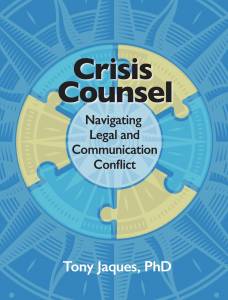Is This the Most Difficult Question to Answer in a Crisis?
By Tony Jaques Ph.D., Director of Issue Outcomes Pty. Ltd. and author of Crisis Counsel: Navigating Legal and Communication Conflict
The most difficult questions are typically those to which there is no “good answer.” And when it comes to crisis management, that most difficult crisis question is: “When did you first know about this?”
It may be a cliché, and it may just be an opportunistic reporter. But it’s a dangerous question loaded with potential consequences.
Loaded questions – which contain a false or controversial assumption – can be quite deliberate. Like when the prosecutor in court asks: “Why did you kill your partner?” despite the defendant already pleading not guilty. Or the New Zealand citizen-initiated referendum question on corporal punishment: “Should a smack as part of good parental correction be a criminal offence?” – suggesting an obvious conclusion about good parenting. Or the notorious classic: “When did you stop beating your spouse?”
The best response to a loaded question is to not answer as it was asked – with a yes or no reply – but to challenge the assumption that was built in without repeating the slur. “No, I reject what you are suggesting.”
However, in an organisational crisis, that key question – “When did you first know about this?” – is much more difficult. First, because there is no “good answer.” Second, it’s asked in the glare of publicity. And finally, because of the other questions it inevitably leads to.
- “If you didn’t know that something was wrong, why not?”
- “Isn’t it your job to know about potential crises?”
- “If you did know about it, why didn’t you act earlier?”
- “How long did you know about it before you decided to do something?”
- “If you had acted sooner, could this crisis have been avoided?”
The risk of this difficult question is made even greater by the fact that – as so often happens after a crisis – someone steps forward and says: “Oh yes, I knew about that.” Or worse: “I warned about that problem, and no-one would listen”
The other real risk is when damning documents surface which prove you should have known. Like the engineering report which disclosed structural defects years before the shocking collapse of the Surfside apartment block in Miami in mid-2021.
So, how do you prepare for that difficult crisis question: “When did you first know about this?”
- Make this question a key element of every crisis simulation exercise, and be ready to answer.
- Ensure there is a blame-free process for upward reporting of problems.
- Quickly move the narrative away from timing to focus on what you are doing to respond.
- Communicate every action you have taken, no matter how small, in a human-first response to help people who have been negatively impacted.
- Emphasise the speed of action already taken to help combat any lingering focus on slowness.
- Actively communicate with all key stakeholders to keep them up to date and avert any suggestion of a cover-up.
- Restate your organisational values and commitment to full public disclosure.
- As with all loaded questions, challenge any underlying false assumptions.
But what do you say if there truly was a delay in information reaching the C-suite, or a delay in taking action?
- Give an honest explanation and don’t point fingers.
- Take responsibility and support staff decisions, even if a mistake was made.
- Commit to review the process so it won’t happen again.
- Emphasise how action was taken immediately the situation became clear.
These responses won’t guarantee freedom from criticism, but they will help blunt that most difficult question.
A Parting Thought
Good crisis leaders are good leaders before the crisis happens.
– Elmarie Marais
Learn more about Reputation Risk, CEO apologies, and Crisis communication in Tony Jaques’ new book, Crisis Counsel: Navigating Legal and Communication Conflict.
“Crisis Counsel confirms Tony Jacques position as one of the industry’s foremost experts on issues and crisis management. In addressing the complex interactions between legal and communication crisis responses Dr. Jacques provides riveting case studies and practical advice. It highlights the financial and reputation risks of not effectively integrating communications and legal counsel. It should be on every communications practitioner’s reading list and companies should insist their in house and external legal counsellors read it.” – Noel Turnbull, Former Chair of Turnbull Porter Novelli, Adjunct Professor, RMIT University.
“Senior managers who find themselves in the C-suite for the first time, Crisis Counsel should be mandatory reading. Such specific legal and communications provocations are not covered in university management courses, and the introduction is replete with illuminating case studies and key takeaways. The author provides sage advice for Chief Executives who must ultimately make a decision based upon what they think is the right thing to do; often under pressure. Crisis team leaders and team members will find this book equally of value, as the more you know about it, the better you and the team will be.” – Jim Truscott, Director, Jim Truscott & Associates Pty Ltd, Perth, Australia
“For far too long, the role of lawyers in crisis management has been neglected. If discussed at all, it is often in negative terms. Tony Jaques adjusts this picture in masterly, yet eminently readable terms. His comprehensive discussion of apology in crisis management is likely to be a go-to source for years to come. This is a welcome book for anyone interested in how crisis-confronted corporations (and other organizations, too) can navigate the tricky legal waters of communicating under fire. For university teachers like me, it’s a rich source of well-researched case studies. A gem!” – Chris Galloway, PhD, Head of Pubic Relations, Massey University of New Zealand

